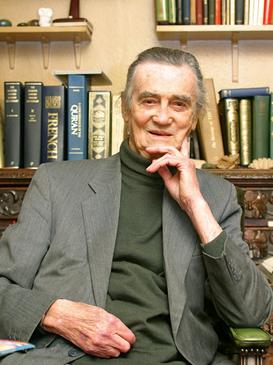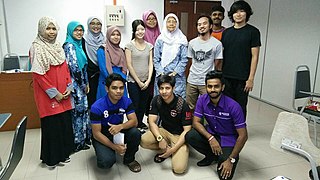Related Research Articles

Seyyed Hossein Nasr is an Iranian-American philosopher, theologian and Islamic scholar. He is University Professor of Islamic studies at George Washington University.

Titus Burckhardt was a Swiss writer and a leading member of the Perennialist or Traditionalist School. He was the author of numerous works on metaphysics, cosmology, anthropology, esoterism, alchemy, Sufism, symbolism and sacred art.

Charles le Gai Eaton was a British diplomat, writer, historian, and an Islamic scholar. He is perhaps best known for his 1994 book, Islam and the Destiny of Man.

Joseph E.B. Lumbard is an American Muslim scholar of Islamic studies and associate professor of Quranic studies at the College of Islamic Studies at Hamad Bin Khalifa University in Qatar. He is the author, editor, and translator of several scholarly books and many articles on Islamic philosophy, Sufism, and Quranic studies.
Maria Massi Dakake is an American scholar of Islamic studies and associate professor of Religious Studies at George Mason University. Her research mainly focuses on Islamic intellectual history, Quranic studies, Shi`ite and Sufi traditions, and women's spirituality and religious experience. She was a contributor to The Study Quran - a modern verse-by-verse commentary of the Quran.

Zailan Moris is a Malaysian scholar of Islamic philosophy and former professor of the School of Humanities at the University Sains Malaysia. Her main interests are Islamic philosophy, comparative religion and Sufism.
Mohammad Hassan Faghfoory is an Iranian-American Islamic scholar and professor of Islamic studies at the George Washington University in Washington, D.C.
In traditionalist philosophy, desacralization of knowledge or secularization of knowledge is the process of separation of knowledge from its perceived divine source—God or the Ultimate Reality. The process reflects a paradigm shift in modern conception of knowledge in that it has rejected divine revelations as well as the idea of spiritual and metaphysical foundations of knowledge, confining knowledge to empirical domain and reason alone.
Caner Dagli is a Circassian-American Islamic scholar and associate professor of Religious Studies at the College of the Holy Cross in Worcester, Massachusetts.

Knowledge and the Sacred is a 1981 book by the Iranian philosopher Seyyed Hossein Nasr. It was originally presented as his Gifford Lectures, which he delivered in 1981. The book is an exposition of perennial philosophy and has been described as a summa of the traditional perspective. It reflects Nasr's desire to revive what he refers to as the sacred quality of knowledge as opposed to knowledge based on sense perception and reason.
Adnan Aslan is a Turkish Islamic scholar.
In perennial philosophy, scientia sacra or sacred science is a form of spiritual knowledge that lies at the heart of both divine revelations and traditional sciences, embodying the very essence of every sacred tradition. It recognizes sources of knowledge beyond those accepted by modern epistemology, such as divine revelations and intellectual intuition. Intellectual intuition is believed to allow access to an innate knowledge of God, which is to be reawakened through the use of human intellect. The principles and doctrines of scientia sacra are derived from reason, revelation, and intellectual intuition, with the conviction that these sources of knowledge can be reconciled in a hierarchical order, and applied in the human quest to understand different orders of reality. Its objective is to show how the transmitted, intellectual, and physical sciences are related and unified within the framework of metaphysics, as traditionally defined.
In perennial philosophy, tradition means divinely ordained truths or principles that have been communicated to humanity as well as an entire cosmic sector through various figures such as messengers, prophets, avataras, the Logos, or other transmitting agencies. The purpose of these sacred truths or principles is to continuously remind human beings of the existence of a "Divine Center" and an "Ultimate Origin." According to this perspective, tradition does not refer to custom, habit, or inherited ways of thinking and living. Contrarily, it has a divine foundation and involves the transmission of the sacred message down through the ages. Used in this sense, tradition is synonymous with revelation, and it encompasses all forms of philosophy, art, and culture that are influenced by it.
In traditionalist philosophy, pontifical man is a divine representative who serves as a bridge between heaven and earth. Promethean man, on the other hand, sees himself as an earthly being who has rebelled against God and has no knowledge of his origins or purposes. This concept was notably developed in contemporary language by the Iranian philosopher Seyyed Hossein Nasr.
Resacralization of nature is a term used in environmental philosophy to describe the process of restoring the sacred quality of nature. The primary assumption is that nature has a sanctified aspect that has become lost in modern times as a result of the secularization of contemporary worldviews. These secular worldviews are said to be directly responsible for the spiritual crisis in "modern man", which has ultimately resulted in the current environmental degradation. This perspective emphasizes the significance of changing human perceptions of nature through the incorporation of various religious principles and values that connect nature with the divine. The Iranian philosopher Seyyed Hossein Nasr first conceptualized the theme of resacralization of nature in contemporary language, which was later expounded upon by a number of theologians and philosophers including Alister McGrath, Sallie McFague and Rosemary Radford Ruether.
In traditionalist philosophy, resacralization of knowledge is the reverse of the process of secularization of knowledge. The central premise is that knowledge is intimately connected to its perceived divine source—God or the Ultimate Reality—which has been severed in the modern era. The process of resacralization of knowledge seeks to reinstate the role of intellect—the divine faculty believed to exist in every human being—above and beyond that of reason, as well as to revive the role of traditional metaphysics in acquiring knowledge—especially knowledge of God—by drawing on sacred traditions and sacred science that uphold divine revelations and the spiritual or gnostic teachings of all revealed religions. It aims to restore the primordial connection between God and humanity, which is believed to have been lost. To accomplish this, it relies on the framework of tawhid, which is developed into a comprehensive metaphysical perspective emphasizing the transcendent unity of all phenomena. Iranian philosopher Seyyed Hossein Nasr elaborated on the process of resacralization of knowledge in his book Knowledge and the Sacred, which was presented as Gifford Lectures in 1981.
Science and Civilization in Islam is a 1968 book by the Iranian philosopher Seyyed Hossein Nasr.
In Search of the Sacred: A Conversation with Seyyed Hossein Nasr on His Life and Thought is a 2010 book about the life and thought of the Iranian philosopher Seyyed Hossein Nasr.
A Young Muslim's Guide to the Modern World is a 1993 book by the Iranian philosopher Seyyed Hossein Nasr.
Islam in the Modern World: Challenged by the West, Threatened by Fundamentalism, Keeping Faith with Tradition is a 2012 book by the Iranian philosopher Seyyed Hossein Nasr.
References
- ↑ Omar 1995, p. 263.
- ↑ Heinen 1994, p. 681.
- ↑ Eaton 1994, pp. 133.